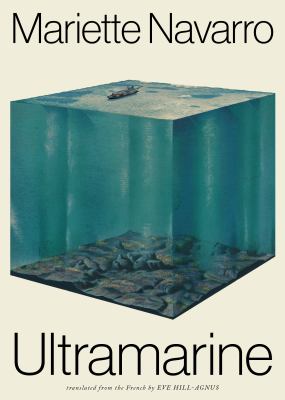One day. Two novellas. One reader. Too much free time. What happens next? A hit and a miss. The hit: the exquisite and absurd “Ultramarine” by Mariette Navarro. The miss: the perhaps noble yet ultimately nauseating “Magma” by Thóra Hjörleifsdóttir. These two fiction debuts have a few things in common. Both came out in the past few years, both are translated works (“Ultramarine” from French and “Magma” from Icelandic), and both take us into the fracturing minds of women. I spent an equal amount of time with them (about an hour each). I picked up “Ultramarine” first.
The main character is a ship captain, a lone woman leading 20 sailors. One day she makes the uncharacteristic decision to cut the engine and allow her crew a recreational swim in the middle of the ocean. 20 men leave the ship, but when it’s time to return, 21 emerge from the water. Suddenly this vessel and ocean the captain knows so well transform into a menacing mystery. But don’t expect a classic whodunit — this story doesn’t sail towards an answer so much as it rocks back and forth, subjecting you to its strange weather: “An incantation, mute and without addressing itself to any particular divinity: rain falls violently on the ship, an evening rain.”

After such a thalassaphobic read I thought it would nice to come back to land: “Magma” by Thóra Hjörleifsdóttir is about a college student, 20-year-old Lilja, in love with an older, careless, and plainly despicable man — earthly territory, I thought, with room for redemption, but it left me seasick and cold. In brief entries, Lilja lets us in on her spiraling world, the landmarks of which include the man’s infidelity, episodes of self-harm, and a constant pulse of self-loathing powered by the peripheral presence of an ex-girlfriend: “He told me recently that they’d been hanging out, watching a movie, and they’d kissed, and he could have slept with her if he’d wanted, but he didn’t because he knew it would hurt me. It’s all so disheartening.”
Conveying the pain and disorientation of life with an abusive partner is a complicated and courageous artistic task. Lilja’s narrative is an interesting attempt in this direction, but ultimately a violent, abrupt and apoetic reading experience. (The book certainly succeeds in that no one can accuse it of romanticizing abuse.) While “Magma” was a miss for me, I recognize the miracle of reading it. It is a privilege to have feelings about books written in languages I can’t read — a privilege I owe to translators of novels, in this case Meg Matich (“Magma”) and Eve Hill-Agnus (“Ultramarine”). So “Magma” won’t be the last Icelandic novel I read. And who knows? Maybe the next one will be a hit.




